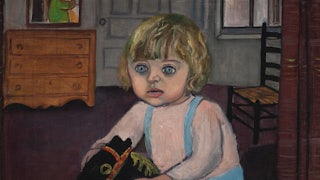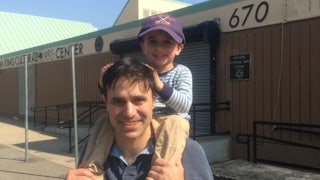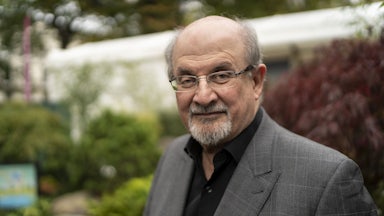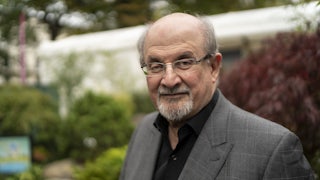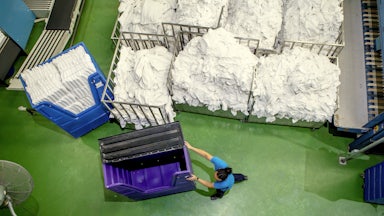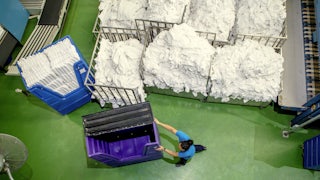For a while now, when writing to a friend to congratulate them on a new baby, I have been signing off with, “It’s the beginning of a great adventure.” I like the way the phrase sounds, especially when I imagine Lou Reed singing it, and I like how it embodies my experience of parenthood, how it gives lie to the notion that such a roller coaster of emotional extremes could be thought of as “settling down.” (So far everyone has been too polite or sleep-deprived to point out that Lou Reed never had children, or to remind me how twisted some of the song’s other lyrics are.)
In Michelle Tea’s new memoir, Knocking Myself Up: A Memoir of My (In)Fertility, a friend tells her that having a baby is “life’s greatest adventure,” and she takes readers along with her with the same wit and humor she’s brought to different worlds throughout her prolific writing life: from her working class hometown of Chelsea, Massachusetts, to the queer scene in the Mission neighborhood of San Francisco in the nineties, to the trippy apocalyptic Los Angles she imagined in the 2016 novel Black Wave. Tea vows not to be “precious” about the adventure, “to keep potential motherhood in its proper place” to approach the matter with “a sense of irreverence, deep (sometimes macabre) humor, a challenging eye, a gossipy tone.”
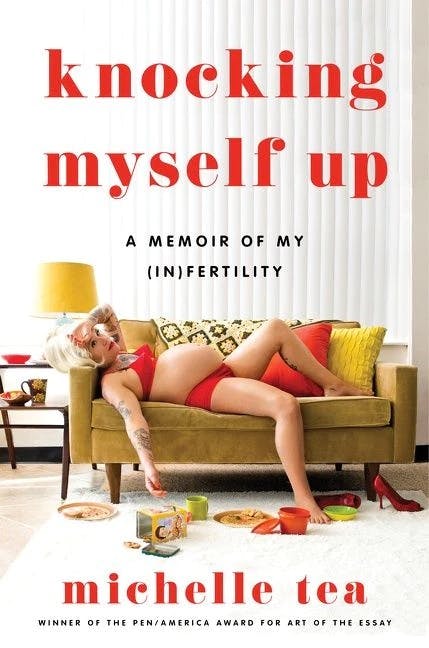
Strikingly, this irreverence and humor reads less as a demystification of pregnancy and more like a re-enchantment of it. After all, we’ve had decades of mommy blogs, memoirs, novels, and films warning us how pregnancy and motherhood threaten our bodies, sex life, careers, finances, creative ambitions, and very sense of self. The title of Jennifer Senior’s influential book All Joy and No Fun deftly points to what has become conventional wisdom: that pregnancy and parenthood may be fulfilling on some grand cosmic scale, but the day to day is assumed to be exhausting, expensive, full of drudgery and anxiety.
It surely says something about the state of affairs, or at least of cultural production, that the most punk thing about Knocking Myself Up is that Tea never stops having fun. A memoir of trying to conceive, her book belongs to a subgenre within parenting memoirs with its own set of struggles, for understandable reasons. But as her subtitle suggests, the line between fertility and infertility is a slippery one. When, newly insured, she calls to ask about coverage for fertility treatments: “‘You mean infertility benefits?’ the lady on the line corrects me. I guess so. But I don’t know that I’m infertile—I’m trying to find out!” (Spoiler alert: whatever you call the benefits, there aren’t any.) For many would-be parents who are older, queer, poor, and/or uninsured, the revelation is not that things don’t always go “as planned” but that there are possibilities, improvisations and work-arounds. Moreover, they can bring to the project wisdom and creativity born of a lifetime of navigating systems not set up for them.
In a Harper’s essay from 2015, Tea describes telling an older stranger on the bus that she’d used her wife’s eggs to become pregnant. The stranger is delighted and exclaims, “It’s like a fairy tale!” The memoir has something of a fairy tale quality throughout. It begins when, at 40, Tea vows to exit a dead-end relationship and pursue motherhood. Shortly thereafter, she meets and falls in love with Orson, who embraces the project. The excitement of new romantic love and the potential of parental love enhance each other, upsetting the familiar story of a zero-sum game where domesticity and sex fight it out for scraps.
Though confronted by obstacles including fibroids, the indignities and costs of the infertility industrial complex, and, most heartbreakingly, a miscarriage on the eve of her wedding to Orson, Tea tells the story with the delight of being lost in an unfamiliar but enchanted forest. When Orson asks about the name of a strange sounding medication, Vivelle, Tea responds, “It’s estrogen. But wouldn’t it be a great name for a girl?” Realizing that using Orson’s younger eggs will greatly enhance her chances, she wonders that “the uterus, amazingly, does not really age. Isn’t that unbelievable?” Though drawn to tarot cards and superstition, Tea reminds us what any biologist will tell you: The wonder is not that our bodies fail but how much goes right all the time without us stopping to marvel at it.
Many accounts of the atomization and losses of contemporary pregnancy ritualistically offer parenthetical acknowledgment of one’s own privileged position, and the rhetorical aside of wonder how those with less privilege can possibly manage. But in Tea’s account, decades of experience as an outsider often work to her advantage. Years of living in and writing about queer and bohemian subcultures, of hard living and also of hard-won sobriety, give her an equanimity and self-knowledge not found in many accounts by authors who seem to be experiencing for the first time a body at odds with their sense of mastery, control, and self-perception.
The book also pays tribute to her wide-ranging chosen queer family, which offers the support so many mothers lack. Along with Orson, we meet Quentin, a drag queen who becomes Tea’s sperm donor, and Rhonda, who helps with the insemination gatherings playfully referred to as “sperm club,” and Tea’s sister, who offers a window into parenting from the other side of the bridge, and countless others. Such communities don’t just happen: Tea has spent years building countercultural institutions from Sister Spit, a queer performance tour to several literary imprints, and she even created a new publication about motherhood, Mutha Magazine, along the way, and the DIY spirit of resourcefulness animates her approach to this other form of creation.
Every fairy tale confronts reality along the way. For one thing, there’s money, probably the one topic that’s still avoided—or, at least, talked about evasively, in most writing about motherhood. Those parenthetical confessions of relative privilege are rarely accompanied by something so crass as a number, but Tea brings the bluntness of someone who’s been broke to the project, asking, in one chapter title, “How Much Does this Shit Cost?” Thanks to Orson, she has health insurance, which she’s lacked for most of her adult life, and she describes with wonderment the “perks” that come from leaving the free clinic behind, like having a better than even chance your appointment won’t be cancelled and you won’t have to wait for hours. (In yet another charming fairy tale effect, the non–free clinic doctor is not only more attentive, she’s also a fellow punk who loves Tea’s tattoo with a line from a Smiths song, while noting she herself was “more of a Dickies fan.”
Then there are the hilariously relatable scenes describing what she terms “the Barney’s effect,” how, when one dwells in a land of unreal prices, “they cease to mean anything. They’re just some kind of code. Some numbers are higher, and some lower. Slowly—slowly—the lower numbers start to feel ... low ... Sort of drifting through an enchanted forest of a fantasy life feeling your brain become addled as items that cost as much as your actual rent begin to seem totally reasonable.” As for designer dresses, so for health care, that insane land of surprise prices. There’s something serious behind the humor: For Gen X parents like Tea and myself, and even more for younger parents, the insane costs of housing and health care, let alone thinking ahead to college and retirement, make any sense of financial responsibility seem like a sick joke. Why try to save a little here and there when the big numbers are just made up and subject to change at the whims of unseen bureaucrats or policymakers?
Aside from a short afterword set last year, Knocking Myself Up takes place largely between 2011, when Tea first tries to get pregnant, and 2014, when she gives birth. While reading, I wondered if my delight in her joyful approach was a sign of the gulf between those years and now. Tea’s child is still in elementary school, and so are mine, but in the years since their births, much writing on pregnancy and parenting has moved beyond the familiar litanies of “the hard things no one tells you about.”
Instead we have the terrors of parenting under Trump and parenting through a pandemic which shut down so many possibilities for the extended communal networks Tea celebrates. Then there’s the flurry of articles and books about whether one would even want to bring a child into a world of climate breakdown, and whether it’s ethical to do so. And now, the end of Roe had made seeking pregnancy using the tools needed by many aspiring parents who are single, queer, trans, older, and/or have medical complications much more dangerous. And all of this is not to mention the terrifying assault on queer and trans people, and the institutions like those Tea has done so much to nourish, including fascist attacks on another of her communal creations, Drag Queen Story Hour.
In the face of all this, what kind of stories should we tell about choosing this adventure, as countless of us still will, despite everything? What does a happy, punk, queer feminist story about pregnancy look like in 2022? For one thing, it’s also an abortion story. After Tea miscarries on the eve of her wedding, she needs a D&C—a routine procedure that can be used either for elective abortion or to complete a miscarriage —but can’t get one for almost a week because providers in San Francisco were already so strained, even in 2013. It’s also a story that invites us to imagine a world where joy is available to more of us, and a story, like much of Tea’s work, about how we take care of each other, in spite of so much.
In the weeks following her son’s birth, Tea feels the weight of mortality: “I never knew for certain that death was real before, I had privately thought that I might live forever. I know how absurd this sounds, but I felt it inside me as a kind of truth nonetheless.” Tea’s account showcases the fluidity of contemporary identity and family bonds, but also of time and narrative. This overlapping of new romance and pregnancy, miscarriage and marriage, of triumph and vulnerability, of birth and death—and, we could add, of private joy amidst political despair—is a different kind of adventure. It’s not so much that one can move instantly from delight to despair, but that experience both together, all the time.

